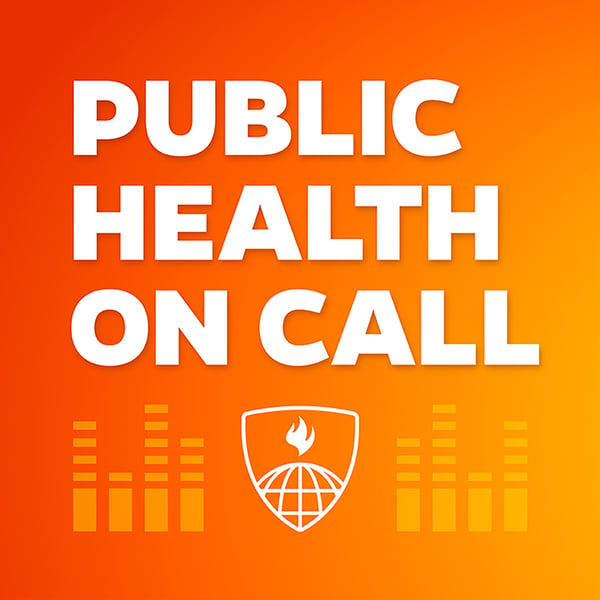915 - America's Caregiver Crisis
Public Health On Call
The Johns Hopkins Bloomberg School of Public Health
4.8 • 620 Ratings
🗓️ 2 July 2025
⏱️ 15 minutes
🧾️ Download transcript
Summary
About this episode:
Caregivers—both paid and unpaid—are the silent backbone of the nation’s workforce, providing crucial support to America’s young, aging, and disabled populations. But 24 states stand on the precipice of crisis with looming threats to caregiver stipends, salaries, and other resources. In this episode: what led to this tipping point, how proposed cuts to Medicaid could make it worse, and how to build a more supportive system for caregivers, patients, and loved ones.
Guest:
Stacey B. Lee, JD is a professor of Law and Ethics at Johns Hopkins University’s Carey Business School, with a joint appointment at the Bloomberg School of Public Health, where she specializes in business law, health law, and negotiations.
Host:
Stephanie Desmon, MA, is a former journalist, author, and the director of public relations and communications for the Johns Hopkins Center for Communication Programs at the Johns Hopkins Bloomberg School of Public Health.
Show links and related content:
-
Despite Political Divisions, U.S. Adults Across Parties Back Affordable Care, Support for Caregivers—Johns Hopkins Bloomberg School of Public Health Department of Health Policy and Management
-
America’s Unseen Workforce: The State of Family Caregiving—Columbia University Mailman School of Public Health
-
The Forgotten Youths Who Are Caregivers For Their Families—Public Health On Call (April 2024)
Transcript information:
Looking for episode transcripts? Open our podcast on the Apple Podcasts app (desktop or mobile) or the Spotify mobile app to access an auto-generated transcript of any episode. Closed captioning is also available for every episode on our YouTube channel.
Contact us:
Have a question about something you heard? Looking for a transcript? Want to suggest a topic or guest? Contact us via email or visit our website.
Follow us:
-
Here's our RSS feed
Note: These podcasts are a conversation between the participants, and do not represent the position of Johns Hopkins University.
Transcript
Click on a timestamp to play from that location
| 0:00.0 | Welcome to Public Health On Call, a podcast from the Johns Hopkins Bloomberg School of Public Health, |
| 0:05.9 | where we bring evidence, experience, and perspective to make sense of today's leading health challenges. |
| 0:16.3 | If you have questions or ideas for us, please send an email to public health question at jh. |
| 0:21.6 | Jh.edu. |
| 0:23.8 | That's public health question at jh.org for future podcast episodes. |
| 0:30.6 | It's Lindsay Smith Rogers. |
| 0:33.0 | Today, the caregiving emergency. |
| 0:35.6 | It's estimated that 53 million people are caregivers paid and unpaid |
| 0:40.7 | for people who rely on them for basic needs. Health law attorney Stacey Lee tells Stephanie |
| 0:46.6 | Desmond that the crisis will only worsen if proposed Medicaid cuts are allowed to happen. Let's listen. |
| 0:53.8 | Stacey Lee, welcome to Public Health on call. |
| 0:57.1 | Stephanie, great to be here. |
| 0:59.3 | So today I want to talk about what's being called a caregiver emergency. |
| 1:04.7 | And I'm just wondering if you could define that for me and explain what we're talking about. |
| 1:09.6 | Sure. |
| 1:09.9 | So when we think of caregiver, I'd first like to define the term. |
| 1:13.3 | So that's paid and unpaid people who provide care, whether it be in nursing homes, |
| 1:19.5 | in homes, in community centers, four, could be adults, could be elders, could be children. |
| 1:28.3 | And when we talk about the caregiver crisis, there are a number of states that have 24, in fact, |
| 1:37.2 | that have been deemed to have a critical emergency when it comes to the availability and the care provided by caregivers across the |
| 1:49.5 | board. And some of these states are Alabama, Nevada, Texas, Louisiana. And in those states, |
| 1:56.4 | demand is not meeting the need. What does the size of this problem look like? Because it sounds like |
... |
Please login to see the full transcript.
Disclaimer: The podcast and artwork embedded on this page are from The Johns Hopkins Bloomberg School of Public Health, and are the property of its owner and not affiliated with or endorsed by Tapesearch.
Generated transcripts are the property of The Johns Hopkins Bloomberg School of Public Health and are distributed freely under the Fair Use doctrine. Transcripts generated by Tapesearch are not guaranteed to be accurate.
Copyright © Tapesearch 2025.

